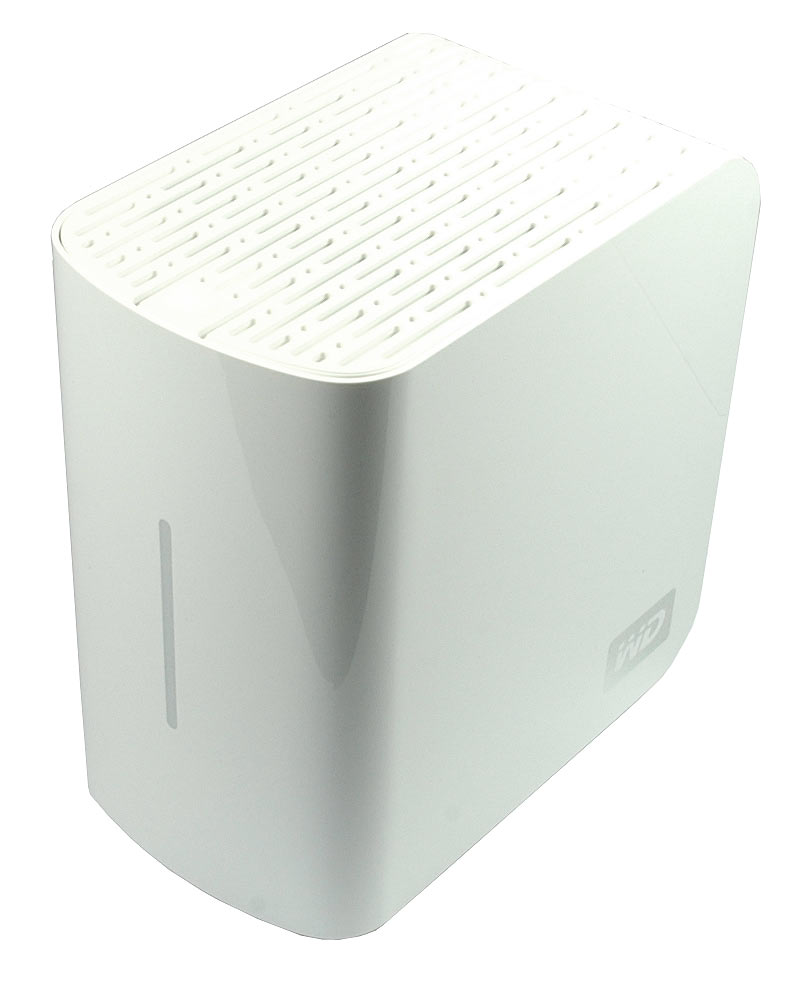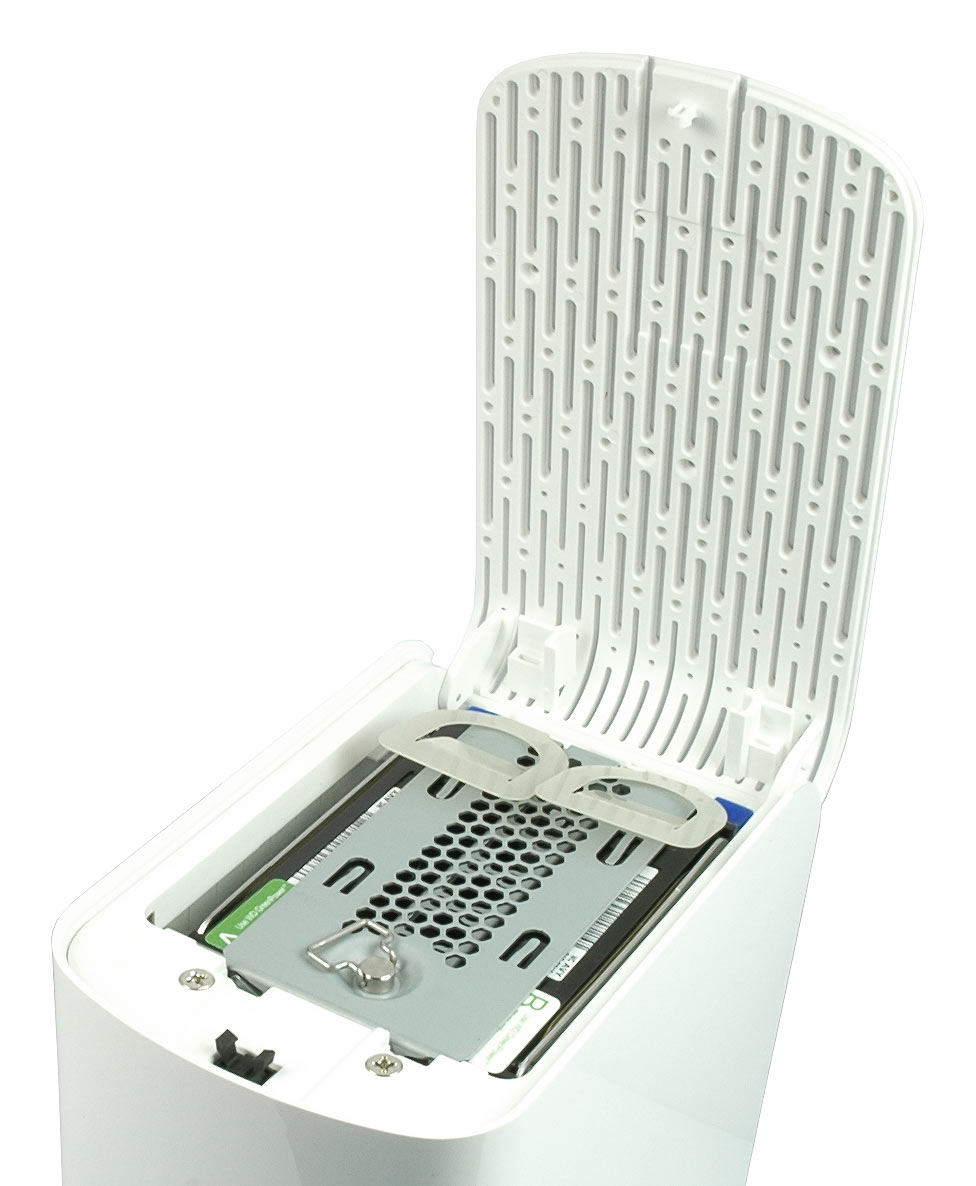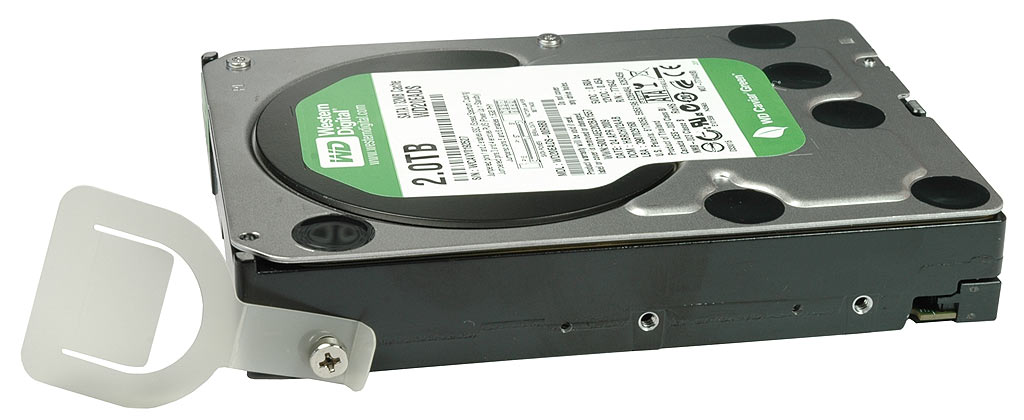NAS Attack: Network Storage From Thecus And Western Digital
Western Digital MyBook World Edition II
Western Digital has been relying on the MyBook design for a few years now, and the MyBook World Edition II follows suit. Since there are two (instead of only one) hard drives inside the “book,” it is wider than many other MyBook products. The front panel sports only a small status LED; all other control elements and interfaces are located on the rear of the device.
Interfaces
There you will find a gigabit networking port, a USB 2.0 port, and the power switch, along with the jack for the external power supply and a reset switch. However, you need an object like a paper clip to operate the small switch.
Exchanging the Hard Drives
Since two drives populate the storage device, WD supports either RAID 0, RAID 1, or JBOD modes (just a bunch of disks). You’d expect the drive to be sealed off to prevent users from removing or exchanging the hard drives, but we were pleasantly surprised by the easily-accessible internals. You are definitely able to exchange hard drives yourself, should you want to. All you need to do is open the top cover of the MyBook World Edition II and remove the metal plate by unfastening a single screw. This plate is used as a lock for the drives. Once removed, you may pull the plastic straps that were installed to facilitate removal of the drives. We particularly liked that you don’t need tools other than a screw driver.
Huge Capacity
WD offers 2TB and 4TB versions of its MyBook World Edition II. As expected, both utilize Western Digital hard drives. Our 4TB test sample was powered by two WD20EADS Green drives. These are based on a four-platter design and they work at a 5,400 RPM spindle speed. NCQ, 32MB of data cahe, and a SATA/300 interface support balanced performance, which is definitely fast enough for NAS applications.
Get Tom's Hardware's best news and in-depth reviews, straight to your inbox.
Current page: Western Digital MyBook World Edition II
Prev Page Attractive New NAS Options Next Page Thecus N0204-
usasma Nice review. I would have appreciated it when purchasing my latest NAS device (Netgear DNS-323).Reply
I've lost faith in the W-D MyBook type devices recently - having had several that have failed due to issues with the circuitry in the case (NOT with the hard drive itself). -
evongugg It would be nice to benchmark a FreeNAS or Openfiler box next to these units. My FreeNAS was free, made of left over parts and is very fast.Reply
It also has a whole lot of features.
-
jblack Why in the world would RAID 1 perform better than RAID 0? --- You'd think at BEST they would be equal.Reply
-
fromeast2west An Atom powered mini-server should be able to match these on both price and power consumption, and destroy them when it comes to features.Reply
I like the idea of a NAS, but haven't seen any company produce one for a price that is in line with performance they offer. -
jasperjones Thanks for the review!Reply
Can you comment on fan noise? Is it audible when the devices are idle?
Asking cause I live in a cozy Manhattan studio ;) -
jawshoeaw The NAS concept continues to be overpriced I think. Still haven't seen a fast 802.11N device. There is something to be said for a simple design with fewer parts to go bad (so the homebrew NAS box is cheaper but more fault prone) - I'd like to see some longevity figures, though of course I would not expect toms to sit around for a couple of years waiting for the NAS to break. Maybe something like the consumer reports long term testing of cars.Reply -
dje007 Thecus’s support is the crappiest I have seen in a long time stay away from them plus there code is bad the only thing it has going for it is linux, if you are looking for a good nas with the ablitly to fix issues your self try QNAP they have a VGA output and give you root access.Reply -
SchizoFrog This review is rubbish... out of the whole genre of NAS it includes 2 individual items, is that it, 2, just 2???Reply
But lets get to the real nitty gritty... Nas is all about network performance, so where are the details about the inbuilt processors and technical specs? There is so much more to account for when buying and setting up a NAS item than just 'Oh look, we can open this box... OOOHHH!!!'
Talk about N00B article... FAIL!!! -
SchizoFrog jblackWhy in the world would RAID 1 perform better than RAID 0? --- You'd think at BEST they would be equal.You obviously have no understanding of RAID and its configurations... No offence intended but go read:Reply
http://en.wikipedia.org/wiki/RAID#Standard_levels -
deanbug I see both points. In theory 0 should have better read/write than 1, but it is limited to the source/destination speed of the drive.Reply
IMHO raid 1 or 5 is for consumers that really want their data, or for businesses. 0 is for people that don't care about data, gamers for fast map load times, or Ninja's:)
(had to have some fun
Obviously there are other uses, for both, but I think those are the most common.



